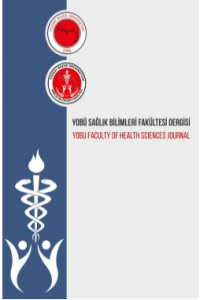SAĞLIKLI YAŞLI YETİŞKİNLERDE BİLİŞSEL GÖREVLİ EGZERSİZİN ETKİNLİĞİ: RANDOMİZE KONTROLLÜ KLİNİK ARAŞTIRMA
Giriş: Yaşlanma ile birlikte bilişsel işlevler, mobilite, denge ve yaşam kalitesi etkilenir. Bilişsel görevleri olan/olmayan egzersizler yaşlanmadaki işlevlerde etkili olabilir.Amaç: Bu çalışmanın amacı, yaşlı erişkinlerde bilişsel görevlerle yapılan egzersizlerin biliş, mobilite, denge ve yaşam kalitesi üzerindeki etkinliğini araştırmaktır.Gereç- Yöntem: Çalışmaya 60-80 yaş arası kırk yaşlı yetişkin dahil edildi. Katılımcılar rastgele olarak bilişsel görevle yapılan egzersiz grubu (Grup 1)(n=20) ve egzersiz grubu (Grup 2)(n=20) olarak ayrıldı. Grup 1'de bilişsel görevlerle birlikteaerobik ve denge egzersizleri, Grup 2'de sadece aerobik ve denge egzersizleri yapıldı. Egzersizler 6 hafta boyunca haftada 3 gün yapıldı. Katılımcılar Montreal Bilişsel Değerlendirme (MoCA), Stroop Testi, Benton Yüz Tanıma Testi (BFRT), Zamanlı Kalk ve Yürü Testi (TUG), Berg Denge Testi (BBT) ve Kısa Form-36 (SF-36) ile değerlendirildi.Bulgular: Grup 1'de MoCA, Stroop Testi, BFRT, TUG, BBT ve SF-36'nın fiziksel fonksiyon, enerji/canlılık, ağrı alt parametrelerinde anlamlı farklılıklar bulundu (p<0.05). Grup 2'de MoCA, BFRT, BBT ve SF-36'nın fiziksel fonksiyon, rol fiziksel, ağrı ve genel sağlık alt parametrelerinde anlamlı farklılıklar bulundu (p<0.05). Gruplar arası karşılaştırma, Stroop, BFRT, BBT ve SF-36’nın ağrı alt parametrelerinde Grup 1 lehine anlamlı farklılıklar ortaya koydu (p <0.05).Sonuç: Bilişsel görevlerle yapılan egzersizler, sağlıklı yaşlı erişkinlerde dikkat ve görsel-uzamsal işlevler, denge ve yaşam kalitesinde etkili olabilir.
Anahtar Kelimeler:
: Yaşlanma, Aerobik Egzersiz, Denge Egzersizi, Bilişsel Göre
THE EFFECTIVENESS OF EXERCISE WİTH COGNITIVE TASKS IN HEALTHY OLDER ADULTS: A RANDOMIZED CONTROLLED CLINICAL TRIAL
Objective: Cognitive functions, mobility, balance, and quality of life are affected with aging. Exercises with/without cognitive tasks can be effective in functions in aging. Aim: The purpose of this study was to investigate the effectiveness of exercises with the cognitive tasks on cognition, mobility, balance, and quality of life in older adults. Methods: Forty older adults aged between 60-80 were included in the study. Participants were randomly divided into the exercise with cognitive tasks group (Group 1)(n=20) and the exercise group (Group 2)(n=20). Aerobic and balance exercises combined with cognitive tasks were performed in Group 1, only aerobic and balance exercises were performed in Group 2. The exercises were performed 3 days per week over 6 weeks. Participants were evaluated by Montreal Cognitive Assessment (MoCA), Stroop Test, Benton Facial Recognition Test (BFRT), Timed-Up and Go Test (TUG), Berg Balance Test (BBT), and Short Form-36 (SF-36). Results: Significant differences were found in MoCA, Stroop Test, BFRT, TUG, BBT, and physical function, energy/vitality, pain sub parameters of the SF-36 in Group 1 (p<0.05). In Group 2, significant differences were found in MoCA, BFRT, BBT, and physical function, role physical, pain, and general health sub-parameters in the SF-36 (p <0.05). Between-group comparison revealed significant differences in Stroop, BFRT, BBT, and pain sub-parameter of the SF-36 test in favor of Group 1(p <0.05). Conclusion: Exercises with cognitive tasks can be effective in attention and visuospatial functions, balance, and quality of life in healthy older adults.
Keywords:
Aging, Aerobic Exercise, Balance Exercise, Cognitive Task,
___
Referans1 Daniel L. Murman. The impact of age on cognition. Semin Hear. 2015;36(3):111-121. doi: 10.1055/s-0035-1555115- Başlangıç: 2020
- Yayıncı: Yozgat Bozok Üniversitesi
Sayıdaki Diğer Makaleler
TEMEL SAĞLIK HİZMETLERİNDE YAŞLI BAKIMI VE KARŞILAŞILAN SORUNLAR
İbrahim KAYABEK, Sibel KARACA SİVRİKAYA
MANEVİYAT, MANEVİ BAKIM VE MANEVİ BAKIMIN HEMŞİRELİKTE ÖNEMİ
Yeliz YELEN AKPINAR, Nesrin AŞTİ
Cevriye YÜKSEL KAÇAN, Aylin PALLOŞ, Özlem ŞENGÖREN DİKİŞ
HEMŞİRELERİN KÜLTÜRLERARASI BAKIM VERME KONUSUNDAKİ GÖRÜŞ VE DENEYİMLERİNİN İNCELENMESİ
